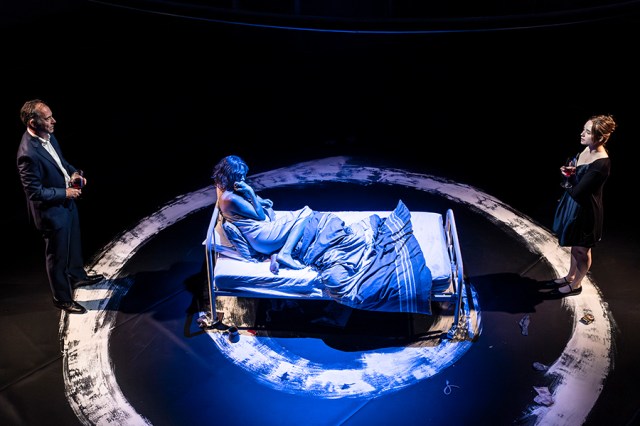That Face at the Orange Tree Theatre – review
Polly Stenham’s early play is revived in Richmond

Polly Stenham wrote That Face when she was just 19 years old and it bursts onto the stage with the fury of youth – but with the sophistication of a much older writer. Its portrait of a family torn apart by dysfunction is at once visceral and devastating, its insights into need and distorted love unforgettable.
Its intensity suits the confined space of the Orange Tree stage, but something feels out of kilter in the balance of Josh Seymour’s production, tilting its emotions beyond the real.
It centres on the relationship between Niamh Cusack’s Martha and her 18-year-old son Henry played, in an impressive stage debut, by Kasper Hilton-Hille. We first see them in bed together – or rather, she is in bed, recovering from an alcoholic binge, and he is slumped across its foot.
As they wake and she goes into a hysterical litany of apology and remorse, it’s clear that their relationship is both overly-close and completely warped. Instead of the mother caring for her son, he is looking after her, trying desperately to pull her out of the depression and alcoholism into which she has plunged after his father Hugh (Dominic Mafham) left the family home to marry again in Hong Kong.
Things come to a head when Mia (Ruby Stokes, in another exceptional stage debut), daughter of the house, is threatened with expulsion from her posh boarding school for drugging and torturing another pupil. Hugh comes home and all hell breaks out.
Eleanor Bull’s design sets all the action around the bed at its centre, with the space descending into ever greater chaos as events and feelings spin out of control. Within this arena, Martha prowls like a monstrous succubus, devouring Henry with her overwhelming desperation and semi-incestuous longing, terrified of abandonment.
Cusack plays her with overwhelming vehemence, absorbing the energy around her. But she feels like a character without context, a contemporary Miss Havisham, so huge that she flattens the steps that have brought her to this place. Under this spotlight, it is Henry’s story that becomes the focus. His overpowering longing to have achieved something in his care of his mother over five long years, means that he becomes as reluctant to let go as his mother.
“It can’t have been for nothing,” he cries, and Hilton Hille captures the poignancy of those words, the need to cling to some meaning in the wreckage of his life, gently mining both the confusion and exhaustion that his unnatural role has caused.
As the sister who walked away, carrying her own burden of grief and loss, Stokes is equally fine, constantly suggesting the pain that lurks beneath her glossy, cynical exterior. Her watchful presence and her love for her brother are a constant reminder of the havoc to which family life can descend. “You’re a good boy to bad parents” says the hopeless and hapless Hugh to Henry at one point. Stenham’s play is a savage analysis of just how much suffering families can cause.















